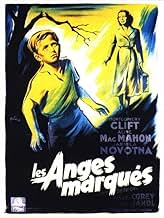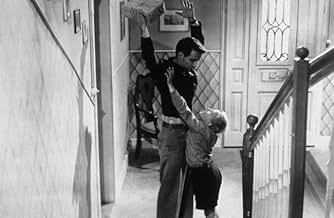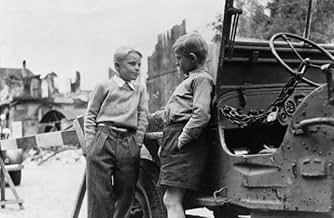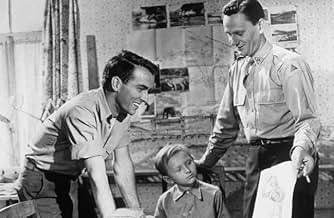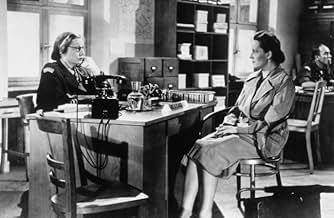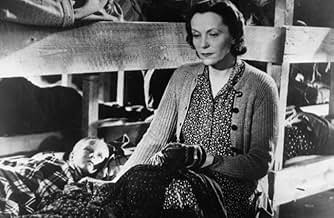PUNTUACIÓN EN IMDb
7,8/10
5,2 mil
TU PUNTUACIÓN
En el Berlín de la posguerra, un soldado estadounidense ayuda a un niño checo perdido a encontrar a su madre.En el Berlín de la posguerra, un soldado estadounidense ayuda a un niño checo perdido a encontrar a su madre.En el Berlín de la posguerra, un soldado estadounidense ayuda a un niño checo perdido a encontrar a su madre.
- Dirección
- Guión
- Reparto principal
- Ganó 1 premio Óscar
- 7 premios y 7 nominaciones en total
Reseñas destacadas
Aside from some dated music and ponderous narration, this is a nearly perfect film. It's surprising, then, that people rarely talk about this being among Montgoery Clift's best work. I, for one, prefer this over From Here to Eternity, Raintree County or even The Heiress. This is because I rarely have encountered a movie that has so pulled me in emotionally to the story. I'm a guy and I don't just start bawling at everything, but I defy ANY person to watch this film with a dry eye! It just doesn't seem possible.
The story is less about G.I. Clift than about a sad but adorable little boy he encounters wandering around in post-war Germany. At first, the boy is wild and doesn't trust anyone, as he and his family had been through the holocaust. Somehow in the concentration camp, he and his mother had become separated and at the end of the war, he had run away from the allied resettlement program because he had a natural fear of ALL soldiers. Despite these tragedies, the boy did not give up hope of one day finding his mother, though Clift plans on taking him back to the States because he knows it is hopeless to go on searching.
You've GOT to see this film! You've GOT to show it to your kids! Although the Diary of Ann Frank and Shindler's List have received a lot of attention, this little film is every bit as poignant and important for understanding the real impact of World War II.
The story is less about G.I. Clift than about a sad but adorable little boy he encounters wandering around in post-war Germany. At first, the boy is wild and doesn't trust anyone, as he and his family had been through the holocaust. Somehow in the concentration camp, he and his mother had become separated and at the end of the war, he had run away from the allied resettlement program because he had a natural fear of ALL soldiers. Despite these tragedies, the boy did not give up hope of one day finding his mother, though Clift plans on taking him back to the States because he knows it is hopeless to go on searching.
You've GOT to see this film! You've GOT to show it to your kids! Although the Diary of Ann Frank and Shindler's List have received a lot of attention, this little film is every bit as poignant and important for understanding the real impact of World War II.
I love the old WWII movies and how they portray what life was like for the men and women who served - and what it was like for the families etc. But of all the ones I've seen, I don't think I've seen a single one that highlighted the plight of the children. I'm glad this one chose to bring this sad effect of war to the public in this film.
The movie starts more like a documentary with a female narrator telling part of the story. At times the narration is a little annoying. But most of the rest of the film unfolds naturally without the narration. The film is a heartbreaking tale of the orphaned children of the war. They have nowhere to go and are shuttled from orphanages to resettlement centers. I was so shocked when I first saw the children - they looked so emaciated and dirty. They all seemed to have shell-shocked expressions on their faces. I think the director (Fred Zinneman)did a great job of casting and going for a realistic portrayal and not trying to gloss over the true realities. Being of Austrian Jewish heritage, the story no doubt hit close to home for him.
The actual location shooting in bombed out cities of Germany was also quite stark and realistic. I'm glad they chose not to try to replicate the devastation in a studio. Being filmed in 1948, 3 years after the end of the war - I was shocked to see how much destruction was still evident, with huge piles of rubble laying around. The cities looked deserted.
This was one of Montgomery Clift's first films. He doesn't appear until 36 minutes into film. He delivers a fine performance given his inexperience (although he was experienced on the stage). He is still in possession of his youthful good looks which deteriorated later. Too bad he lived such a young, tragic life as he was quite a natural talent. The young boy is quite a good actor for his age and manages to express his desperation through his body language and action since he doesn't speak for almost 2/3's of the film.
There are many memorable and shocking scenes: the drowning of one of the children, the young boy searching through a crowd of women for his mom, several scenes of his wild and desperate attempts to escape at all costs, and the hordes of children exiting from the train as they arrive at the settlement center. Many of these scenes are some I will never forget.
I'm shocked so few people have seen this (given only 37 comments and 1000+votes on IMDb at this time). I highly recommend this film if you are interested in movies about the sad effects of war.
The movie starts more like a documentary with a female narrator telling part of the story. At times the narration is a little annoying. But most of the rest of the film unfolds naturally without the narration. The film is a heartbreaking tale of the orphaned children of the war. They have nowhere to go and are shuttled from orphanages to resettlement centers. I was so shocked when I first saw the children - they looked so emaciated and dirty. They all seemed to have shell-shocked expressions on their faces. I think the director (Fred Zinneman)did a great job of casting and going for a realistic portrayal and not trying to gloss over the true realities. Being of Austrian Jewish heritage, the story no doubt hit close to home for him.
The actual location shooting in bombed out cities of Germany was also quite stark and realistic. I'm glad they chose not to try to replicate the devastation in a studio. Being filmed in 1948, 3 years after the end of the war - I was shocked to see how much destruction was still evident, with huge piles of rubble laying around. The cities looked deserted.
This was one of Montgomery Clift's first films. He doesn't appear until 36 minutes into film. He delivers a fine performance given his inexperience (although he was experienced on the stage). He is still in possession of his youthful good looks which deteriorated later. Too bad he lived such a young, tragic life as he was quite a natural talent. The young boy is quite a good actor for his age and manages to express his desperation through his body language and action since he doesn't speak for almost 2/3's of the film.
There are many memorable and shocking scenes: the drowning of one of the children, the young boy searching through a crowd of women for his mom, several scenes of his wild and desperate attempts to escape at all costs, and the hordes of children exiting from the train as they arrive at the settlement center. Many of these scenes are some I will never forget.
I'm shocked so few people have seen this (given only 37 comments and 1000+votes on IMDb at this time). I highly recommend this film if you are interested in movies about the sad effects of war.
7sol-
Having fled a refugee centre in post-World War II Germany, a traumatised boy with selective mutism is taken in by a kindly soldier while his mother desperately searches for him in this war drama starring Montgomery Clift as the soldier. 'The Search' was Clift's first big screen performance and he is great every step of the way, radiating genuine excitement when teaching the boy how to speak and the bond that develops between them is undeniable. Jarmila Novotna is also fine as the boy's mother, never once lapsing into melodrama in a nicely down-to-earth turn, and Ivan Jandl as the boy in question won a special Oscar for his performance. The film takes quite a while to warm up with Clift not making an appearance until over 30 minutes in. The beginning portion of the film also features a lot of sentimental voice-over narration that spells out the obvious (the kids are described as "children who had a right to better things"). There are, however, also several fantastic moments early on. The bumpy, silent ambulance ride in which tension and anxiety within the kids gradually swells up rates as one of the finest sequences that director Fred Zinnemann ever filmed - and the subsequent near-silent chase scene is equally as intense. Whatever the case, the final hour or so of the film (in which the narration practically disappears) is excellent stuff. Clift's altruism is especially resonating as the film looks at the ability of humanity to triumph in the face of the inhumanities of war, and the use of actual desolate postwar German locations injects a chilling sense of authenticity into the air.
After watching Roberto Rossellini's 1947 final part of his war trilogy "Germania anno zero", Fred Zinnemann's "The Search" is in direct contrast. While Rossellini approaches a similar subject with absorbing objectivity, "The Search" opts for sentimentality, although Zinnemann tried to add a documentary dimension to the story. It's the tale of a boy who is rescued by an American G.I. in Berlin, while the boy's mother is looking for him in refugee camps, after they were separated in Auschwitz during the war. Mother and child are pretty close but do not know it, so the story goes from scenes of the soldier educating the boy, to the mother's giving love to surrogate sons in a UN home for war orphans. Zinnemann's tact (or lack of passion, as some may say) nevertheless makes it work, as well as the performances by Montgomery Clift as the soldier and young Ivan Jandl as the kid, who won a special Oscar.
I got to this movie randomly in the night program and found it was rather undeservedly relegated to past 11pm duties on TV. For Germans, it may be hard to chew the past concentration camp experiences of Children survivors in English and American orphanages and the highlighted search of a mother for her young boy, from whom she has been separated during the war. Sentimental : Yes Heart Gripping : Yes Wonderful to watch to the (happy ???) ending ? Yes all over. Great performances by the young boy, Ivan Jandl, the mother and the orphanage manager and very convincing performances of Montgomery Clift and Wendell Corey as teachers and father stand ins. I do know the ending, but it grips me nevertheless, even on replay. And if you're not icy to the heart, it will do the same for you.
¿Sabías que...?
- CuriosidadesBen Mankiewicz on TCM indicated that Ivan Jandl spoke no English at the time this film was made, and that his English dialogue was phonetically memorized.
- PifiasOn Montgomery Clift's right shoulder, he wears the patch of the 102nd infantry division, but it is sewed on incorrectly; it is turned 90 degrees to the right.
- Citas
[Steve is teaching a young boy, whose name he does not know but has coined Jim, to speak English]
Ralph 'Steve' Stevenson: [to Jim] You have no idea how useful it's going to be for you to know English. You can go where ever you like. Everybody knows what 'OK' means. You can use English all over the world. Not, not just America: Canada, Africa, Australia, India. Even in England, they understand English... well, sort of.
- Versiones alternativasThere is an Italian edition of this film on DVD, distributed by DNA srl, "LA SETTIMA CROCE (1944) + THE SEARCH (Odissea tragica, 1948)" (2 Films on a single DVD), re-edited with the contribution of film historian Riccardo Cusin. This version is also available for streaming on some platforms.
- ConexionesFeatured in Hollywood y el holocausto (2004)
Selecciones populares
Inicia sesión para calificar y añadir a tu lista para recibir recomendaciones personalizadas
- How long is The Search?Con tecnología de Alexa
Detalles
Taquilla
- Presupuesto
- 250.000 US$ (estimación)
- Duración
- 1h 44min(104 min)
- Color
- Mezcla de sonido
- Relación de aspecto
- 1.37 : 1
Contribuir a esta página
Sugerir un cambio o añadir el contenido que falta


